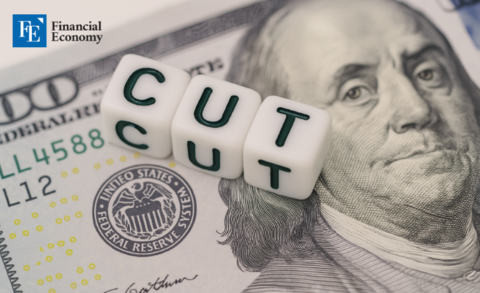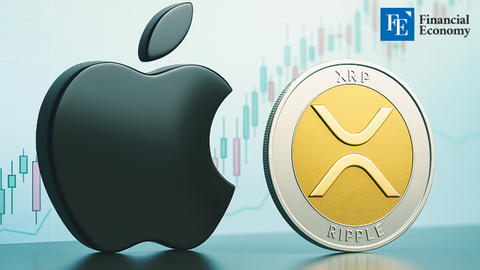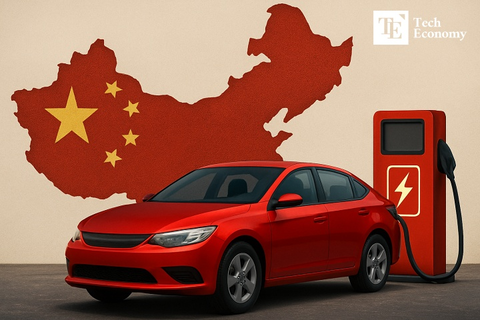The “Tesla Takedown”: How Elon Musk’s Political Persona Sparked a Global Backlash
Input
Modified
Politics and Protest: The Spark Behind the Movement A Generational Divide and a Crisis of Credibility Global Repercussions and the Limits of Influence
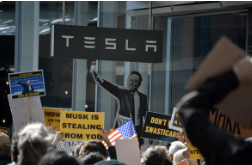
Politics and Protest: The Spark Behind the Movement
In the world of business, it’s often said that one should keep politics and business separate. While many corporate leaders in the past have dabbled in politics, the consequences of doing so have never been more pronounced than in the case of Tesla CEO Elon Musk. Musk, a billionaire entrepreneur known for his controversial statements and bold actions, has found himself at the center of a growing and increasingly volatile protest movement: the "Tesla Takedown." What started as a small, grassroots protest over his company's practices has now evolved into something far more significant, fueled by a combination of political, social, and economic factors. In the face of growing opposition, Musk is beginning to learn the difficult truth that once business leaders step into the political sphere, the consequences can be both swift and far-reaching.
The movement, which has been gaining traction across the United States and internationally, is directed not only at Musk himself but also at his company, Tesla. Tesla, once a symbol of innovation and progress in the electric vehicle (EV) industry, has become a lightning rod for critics who accuse Musk of mishandling the company’s business practices and political affiliations. But the issue at hand isn’t just about Tesla’s environmental impact or business decisions—it’s about the broader backlash against Musk’s outspoken and often controversial political views. The "Tesla Takedown" movement is a reflection of how politics and business can intertwine in volatile and dangerous ways.
One of the most surprising aspects of this protest movement is that it doesn’t seem to have its roots in traditional left-wing politics. Musk, known for his libertarian-leaning stances, is often associated with conservative ideals and free-market principles. But the protests against Tesla have drawn a broad coalition of individuals, many of whom don't fit neatly into the typical Democratic or Republican camps. In fact, some protestors, according to reports, seem to be dissatisfied with Musk's policies not because they align with left-wing values, but because they perceive him as contributing to a wider political and economic system that prioritizes the rich and powerful over the average citizen.
Critics of the Tesla Takedown movement have even speculated that the protests may not be as grassroots as they appear. Some have suggested that the protests are "astroturfed," meaning they are not spontaneous uprisings of the people but instead carefully organized campaigns designed to appear as if they are. This speculation highlights a growing divide between the public perception of the protests and the reality of who is behind them. Some see the movement as a way for political adversaries to use Musk’s popularity and influence to further their own agendas. Whether or not this is true, the sheer size and scope of the protests are undeniable, and they signal a new level of frustration among a wide swath of the population, spanning various demographics and political affiliations.
In fact, what is truly surprising is that the protests against Tesla do not seem to be coming exclusively from the traditional Democratic base. Typically, protests in the U.S. are aligned with either liberal or progressive causes, with demonstrators targeting corporations or individuals whose policies they see as harmful. However, the "Tesla Takedown" protests appear to be drawing from a more diverse group of individuals, with some reports indicating that a significant portion of those attending the protests are from younger generations. While older generations may feel that Musk represents the epitome of the American dream, a younger generation, disillusioned with corporate greed and increasing wealth inequality, is now viewing Musk through a more critical lens.
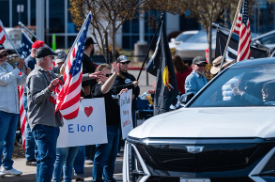
A Generational Divide and a Crisis of Credibility
The generational divide in the protest movement is notable. Younger protesters, especially those in their 20s and 30s, often feel that the promises of innovation and sustainability associated with Tesla are overshadowed by broader issues such as Musk’s wealth accumulation, his influence over global markets, and his often dismissive stance toward employee rights. These critics argue that while Tesla and Musk promote themselves as being at the forefront of green technology, the company’s labor practices, environmental footprint, and Musk’s political statements make them question whether Tesla is truly living up to its values. In essence, the protest is not only about Tesla’s environmental record but about how corporations like Tesla represent a broader economic and political system that many feel is failing the people.

Global Repercussions and the Limits of Influence
The “Tesla Takedown” movement, then, is not just a local or national protest; it has become an international event that is affecting global perceptions of Tesla and Musk. As Tesla grows and expands into more international markets, the company's impact is no longer confined to American soil. In the European Union, for instance, concerns about Tesla’s approach to sustainability have become more pronounced. As the EU continues to implement increasingly stringent environmental regulations, there are calls for Tesla to be held to a higher standard. This has triggered conversations about whether Musk’s vision of a greener future for humanity is at odds with the way his company conducts business on the ground.
There is also a growing recognition that Musk’s influence extends far beyond the borders of the United States. His outspoken political stances, which have often aligned him with former President Donald Trump, have caused ripples globally, adding an international dimension to the "Tesla Takedown" movement. Globally, Musk is increasingly being viewed as the symbol of a broader political and economic system that prioritizes the interests of the wealthy few at the expense of the general population. The growing anti-Musk sentiment worldwide is not merely about Tesla's business practices or Musk’s eccentric persona but is deeply intertwined with his public political advocacy. Musk's support for policies that critics view as benefiting billionaires, along with his past political donations and alignment with conservative causes, has left him vulnerable to attacks on multiple fronts.
In Europe, for example, Musk's close association with Trump’s policies has led to an increase in boycotts of American-made goods, including those from Tesla. European consumers, already feeling the effects of the growing political divide between the U.S. and European Union, are increasingly turning their backs on U.S. brands they see as complicit in the worsening political climate. With American products being viewed as symbolic of an economic system that has failed to deliver benefits to the majority, Tesla has become a target of this backlash. In countries where economic inequality and environmental concerns are top priorities, Musk’s business decisions and political associations are under intense scrutiny.
Moreover, Tesla’s controversial labor practices and the company’s sometimes combative approach to worker rights have further fueled the flames of dissent. Critics argue that while Tesla touts its innovative technologies, it falls short when it comes to addressing the human cost of those advancements. Workers’ rights have been a recurring issue for Tesla, with labor unions calling for better pay, safer working conditions, and more job security. These issues are compounded by Musk's tendency to downplay concerns about workers' well-being, which has alienated a significant portion of the workforce and contributed to the public perception that Tesla is no different from any other large corporation in its exploitation of labor.
What is clear now is that the "Tesla Takedown" movement has morphed into something far more significant than just a protest against a business. It has become a rallying cry for those who see Musk as the embodiment of corporate greed and political corruption. As Musk’s power grows, so too does the opposition to his influence. The backlash against Tesla is, in many ways, a manifestation of broader societal dissatisfaction with the ways in which business and politics intersect. The movement against Musk and Tesla is about more than just one man or one company—it’s about a political system that has allowed a select few to accumulate power and wealth at the expense of the many.
The "Tesla Takedown" movement is a powerful reminder of the risks business leaders take when they enter the political arena. Once they do, they open themselves up to a new wave of scrutiny, one that can come from unexpected places. Businessmen like Musk, who have long been able to navigate the world of commerce with relative impunity, may find themselves facing a much more hostile environment when they venture into the political sphere. Whether Musk will be able to navigate this growing opposition and salvage his company’s reputation remains to be seen. However, what is evident is that the "Tesla Takedown" movement is not going away anytime soon, and it signals a new era of political activism that will make even the wealthiest and most powerful leaders reconsider their place in the political landscape.
In the coming months, as the protest movement continues to expand, Musk will likely face increasing pressure from both his political opponents and his consumers. Whether these protests will have a lasting impact on Tesla’s bottom line or Musk’s personal political future is still uncertain. However, one thing is clear: the consequences of entering the political fray are more severe than ever, and Musk, like many before him, is learning the hard way that business and politics should never mix.






